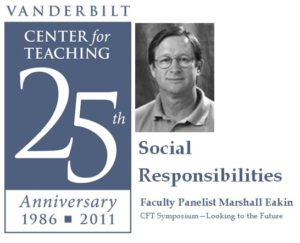Symposium Spotlight: Social Responsibilities
 The history of higher education in the United States has been shaped by the twin aspirations of expanding human knowledge and preparing new generations for responsible social leadership. These defining goals have been written into the mission statements and cultural traditions of most every U.S. college or university and are among the central organizing principles of their endeavors. They are evident in the work of admissions and hiring committees, in curricular offerings across the disciplines, in research agendas, and in student life. Indeed, higher education more than any other social institution has achieved an influence in U.S. systems of knowledge creation, as well as in the intellectual, moral, and professional development of young adults. As John Dewey, among others, would remind us, this knowledge production and leadership development are vital to the growth of our citizenry and thus the progress of our democratic society: “Democracy has to be born anew in every generation, and education is its midwife” (School and Society, 1889).
The history of higher education in the United States has been shaped by the twin aspirations of expanding human knowledge and preparing new generations for responsible social leadership. These defining goals have been written into the mission statements and cultural traditions of most every U.S. college or university and are among the central organizing principles of their endeavors. They are evident in the work of admissions and hiring committees, in curricular offerings across the disciplines, in research agendas, and in student life. Indeed, higher education more than any other social institution has achieved an influence in U.S. systems of knowledge creation, as well as in the intellectual, moral, and professional development of young adults. As John Dewey, among others, would remind us, this knowledge production and leadership development are vital to the growth of our citizenry and thus the progress of our democratic society: “Democracy has to be born anew in every generation, and education is its midwife” (School and Society, 1889).
Yet in recent decades, many critics, often inspired by Dewey, have argued that the goals of educating future leaders and citizens have succumbed to other priorities, negatively affecting the very heart and soul of higher education. Instead of teaching civic engagement or ethical leadership, for example, many such as Thomas Ehrlich have claimed that higher education has become narrowly focused on scholarship. While scholarship is vital, an overemphasis on it can diminish the quality of education in general and thus deprive the next generation of the intellectual capabilities to address public issues. Others, such as Peter Gomes in The Good Life, Vanderbilt’s first-year reading for this year, have decried higher education for abandoning, or at least marginalizing, a curriculum that teaches to the whole person in favor of mere professional training and placement. Whatever the cause, critics often agree that much of higher education does not prepare students with the abilities to resolve some of the toughest challenges facing our society.
Are these concerns for higher education legitimate, and how relevant are they to Vanderbilt? How are we preparing students at Vanderbilt to address the many social problems or challenges our world confronts? What changes might we need to make in the ways we teach, or in the contexts of our teaching, to better prepare students to become the next generation of leaders? What best practices or limits should we follow in our efforts to enhance our students’ moral development and social responsibility? These are some of the issues and questions that will guide conversation in the CFT’s 25th Anniversary Symposium discussion of “Social Responsibility in Higher Education” led by Professor of History, Marshall Eakin. We hope you can attend.
The Symposium will begin at 9:10 with opening remarks by Provost Tim McNamara and CFT Acting Director Derek Bruff, and then each of the three featured faculty panelists – Cecelia Tichi, Cynthia Paschal, and Marshall Eakin – will speak for 10-12 minutes on their respective themes. Faculty, students, and staff are welcome to attend all the sessions or drop in for an hour or two as they are available. The Symposium will be held on the 2nd Floor of The Commons, in rooms 235-237. Let us know if you’ll be attending this event by sending a quick RSVP.

Leave a Response